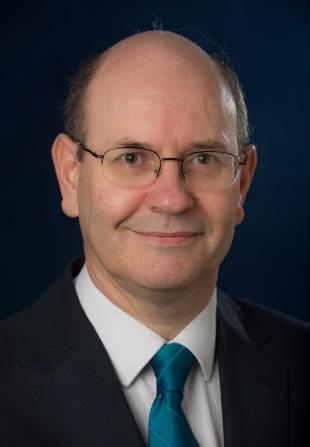Email:
Location:
Engineering Discipline:
- Chemical Engineering
Biography:
I became Professor of Interfacial Science & Engineering in Edinburgh in 2020 (and was Director of Chemical Engineering from 2020 to 2024) after eight years at the University of Northumbria at Newcastle where I was first Executive Dean of the Faculty of Engineering & Environment and then Pro Vice-Chancellor (REF). Prior to that I spent twenty two years as as an academic at Nottingham Trent University where I was a Professor and Head of the Research & Graduate School (Science & Technology) in the College of Arts & Science and formerly Head of Physics & Mathematics. In my earlier career I held a Royal Society European Fellowship at the University of Paris VI (Pierre et Marie Curie) and both gained a PhD in Applied Mathematics and was awarded a BSc (Hons) First Class in Mathematical Physics by the University of Nottingham.
My research involves wetting, interfacial science and engineering and is undertaken as part of the Institute for Multiscale Thermofluids. It has attracted many funding awards including over twenty RCUK/EPSRC grants, mainly as Principal Investigator, and including both an EPSRC Platform Grant (awarded only to world-leading groups) and an EPSRC Centre for Doctoral Training. I have published over 250 refereed journal papers, which are cited ca. 1200 times annually (Google Scholar), and have been awarded seven patents. I am a Fellow of the Royal Society for Arts, Manufactures & Commerce (FRSA), a Fellow of the Higher Education Academic (FHEA), a Fellow of the Institute of Physics (F.Inst.P) and a Senior Member of the Institute of Electrical & Electronic Engineers (SMIEE). I am a member of the EPSRC Peer Review College and lead a UK Fluids Network Special Interest Group. I have previously been a Board Member of the Award Winning BIM Academy Enterprises Ltd, an Editorial Board member of Advances in Colloid & Interface Science, a UK Management Committee representative on COST Actions, and I was a member of sub-panel 13 for "Electrical and Electronic Engineering, Metallurgy and Materials" for the UK Research Excellence Framework (REF2014).
Academic Qualifications:
- BSc (Hons) First Class, University of Nottingham, 1983
- PhD University of Nottingham, 1986
Professional Qualifications and Memberships:
- Fellow of the Royal Society of the Arts, Manufactures & Commerce (FRSA, 2017)
- Chartered Physicist (CPhys) and Fellow Institute of Physics (FInstP, 2002)
- Fellow of the Higher Education Academy (FHEA, 2007)
- Senior Member Institute of Electrical & Electronic Engineers (SMIEEE, 2002)
- Member of the International Society of Bionic Engineering (MISBE, 2019)
- Member of the Advisory Board for the Key Lab in Bionic Engineering, Jilin University, China (2019-2022)
Teaching:
- Year 3 Chemical Engineering Laboratories
- Year 4 Chemical Engineering Study Projects
- Year 5 Research Project and Industrial Project Supervisor
- MSc Research Project Supervisor
Research Interests:
My research includes smart and advanced materials, functional surfaces, static and dynamic wetting of surfaces (theory and experiment) and acoustic waves (fundamentals and sensor applications. These are encompassed within three key areas of Interfacial Science & Engineering, Smart Materials & Surfaces and Wetting & Dewetting. The key themes of my research are,
- Nature and Bio-Inspired Surface Engineering: Natural surfaces, such as the Lotus Leaf and Nepenthes Pitcher plant, and natural systems such as galling aphids, are used as inspiration for self-cleaning, phase change (evaporation and condensation) systems, anti-fouling and anti-icing/de-icing;
- Wetting, Dewetting and Fluids: Video-microscopy and flow systems are used to study the interaction and evolution of liquids on surfaces. These surfaces have different geometries (planar, fiber, etc), can be smooth or patterned and can be smart and functional surfaces;
- Superhydrophobic, Superwetting and Slippery Surfaces: Lithography, electrodeposition and etching to sculpture surfaces at the nano- and micro-level is used to obtain extreme water repellency, imbibition beyond that which chemistry alone can deliver or superslippery lubricant impregnated surfaces (SLIPS) which reduce friction and drag increasing efficiency and minimising energy loss;
- Electrowetting, Dielectrowetting and Liquid Optics: Liquid surfaces are shaped and droplets are controlled using electrostatic forces to create programmable diffraction gratings and lenses;
- Acoustic and Surface Acoustic Wave Sensors: High frequency vibrations of quartz crystal microbalances (QCMs) and surface acoustic wave devices (SAWs) are used to probe liquid properties, and the solid-liquid and solid-vapour interfaces with selectivity achieved via surface coatings.
Applications for this research include heat and mass transfer, evaporation and condensation, friction and drag reduction, and fluid dynamics and microfluidic systems.
Research Profiles
Further Information:
- I am always open to enquiries to supervise PhDs (self-funded, via University or Other Scholarships or sponsored PhDs) or host visiting researchers. University-funded PhD positions are either advertised on FindaPhD or applications can be made for agreed projects which, if a student receives an offer, enables application for University Scholarships, e.g.
- EPSRC Doctoral Training Awards (UK, EU and Overseas Students)
- Edinburgh Global Research Scholarship (for high quality Overseas Students)
- Principal's Career Development PhD Scholarships (UK, EU and Overseas Students)
- China Scholarship Council/University of Edinburgh Scholarships (Citizens and Permanent Residents of the People's Republic of China)
- Croucher Foundation Study Awards (Permanent Hong Kong Residents)
- The Royal Commission for the Exhibition of 1851 (Industry-based PhD)
- I lead the UK Fluids Network (UKFN) Special Interest group (SIG) in Droplet and Flow interactions with Bio-Inspired and Smart Surfaces.
- I have a strong belief in public understanding of research and have co-developed Natures Raincoats exhibition and website.



